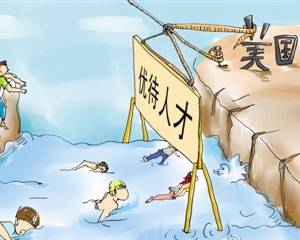
27 Jun, 2013
Why does China’s top talent stay overseas?
June 26, 2013 – To attract talent back home, we need to focus on more than high-quality living conditions and work opportunities. We need reform in technology, education and talent management systems, in order to create a pleasant environment where talented people can concentrate on their research.
A piece of recent news has attracted considerable attention. The head of the Central Personnel Management and Coordination Office said during an interview that China has the highest attrition rate of its top talent in the world; 87 percent of its best scientists and engineers leave the country and stay overseas.
|
(China.com.cn) |
In the context of building an innovative country and implementing our strategy of innovation driving development, this information has aroused concern at every level. The question that needs to be addressed is why so many of our best people go to study abroad and then stay there.
The answer to that question may be found in an old Chinese saying: men struggle upwards and water flows downwards. In this context “upwards” implies factors like a pleasant work environment and a good standard of living. Especially in the high-tech industry, a pleasant work environment is extremely important.
The desire to succeed and to stand out from the crowd is a dream common to all. It is natural that scientists and engineers who have studied hard overseas and achieved academic success will want to find a good work environment to apply what they have learned and go on to greater things. These are the well-earned fruits of their years of hard work, and such ambitions reflect their personal values. Today, with the flow of talent subject to increasing globalization, it seems reasonable that high-tech achievers choose to move upwards and stay there.
Therefore, instead of directing a helpless sigh in the direction of our departing talent as it disappears overseas, we should address ourselves to our shortcomings, especially in terms of the work environment.
The work environment can be considered in two parts: the hard environment and the soft environment. Recent years have seen a consistent and stable increase in investment on research and development, with the result that our “hardware” – including elements like salaries and availability of equipment – is much better than before. Indeed the condition of this “hardware” in many universities and research institutions is by no means inferior to the situation in many developed countries. What we need to improve is our soft environment:
Do our systems for professional peer review and the election of members of academic bodies reflect the principle of merit first and foremost?
Are our scientific research and project evaluations objective and fair?
Is the process of applying for financial support too complicated for researchers?
Have political considerations been allowed to interfere with the development of high-achievers?
Do we lack the means to apply sanctions to under-performers?
Do we provide a free and democratic environment for academics to engage in scientific research?
Are our scientific structures still blighted by internal politics?
Even the most cursory analysis of suggestions and observations that appear in newspapers and on the Internet reveals that our overseas achievers have high expectations that demand improvements in our soft environment.
Patriotism and dedication to the motherland are a core tradition among Chinese scholars. In the early 1950s, at a time when resources were very scarce, many overseas students like Qian Sanqiang, Qian Xuesen, Li Siguang and Deng Jiaxian came back home and struggled to overcome the obstacles they encountered. They made a great contribution to developing science and technology for the new China. Since opening-up, many other young scientists have returned – people like Chen Zhu, Wang Xiaodong, Shi Yigong. They have carried on with their research while also working to promote institutional reform. Many of those Chinese scientists who stay overseas also think about China and contribute in various ways to our science and technology.
It is no more than common sense for any country to recognize that science and technology are its primary productive force, and talent is its primary resource. The battle to attract talent has been silently escalating. To attract our achievers back home, as well as providing high-quality living conditions and good working facilities we need to focus on further reform of our technology, education and talent management systems, in order to create a pleasant “soft” environment where our best people can concentrate on their research.
Only in this way will they put aside their concerns and doubts and come back home and our place as the highest ranking source of “brain-drain” will be consigned to history.
Read the Chinese version: 顶尖人才滞留海外为哪般
Source:People’s Daily, author: Bai Muding
Edited and translated by Shen Qing, People’s Daily Online




Liked this article? Share it!